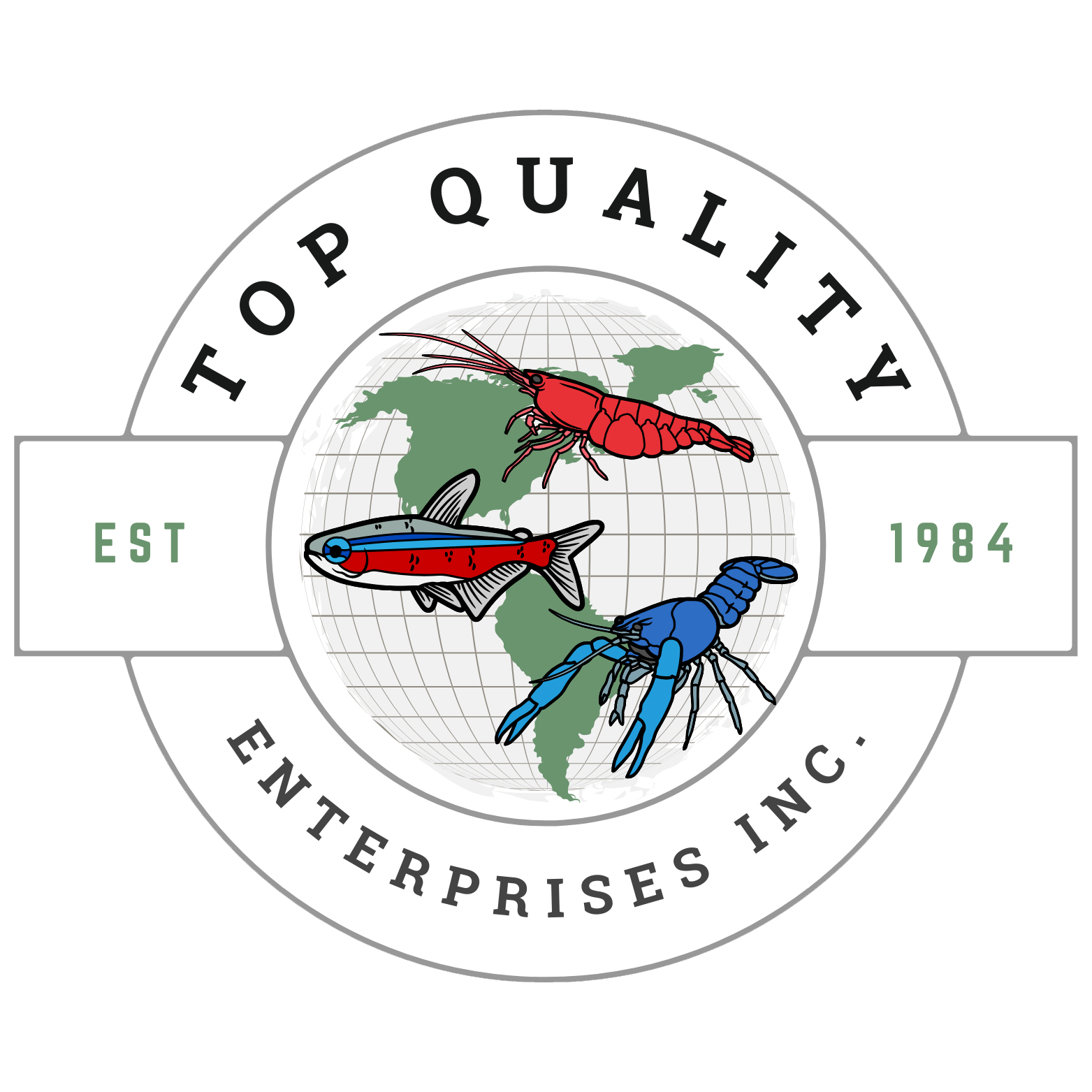The Tide Is Turning
Not too long ago, imported goods dominated store shelves. Retailers leaned heavily on overseas suppliers for one main reason—cost. The promise of cheaper prices, wide variety, and global access seemed unbeatable. Shipments came from across oceans, crossing borders and time zones, filling aquariums, grocery stores, and markets everywhere. It was the way things worked.
But the world is changing. Slowly at first, and now all at once. Retailers are rethinking how they source their products. After years of relying on imports, many are realizing that “cheaper” doesn’t always mean “better.”
At Top Quality Enterprises Inc., we’ve seen this shift up close. In the tropical fish industry, we’ve watched retailers move from distant imports to trusted domestic farms—choosing quality, reliability, and ethical sourcing over short-term savings. It’s not just a trend; it’s a transformation.
Today, local farms are no longer a backup plan—they’re the preferred choice. From food to aquaculture, retailers are prioritizing freshness, health, and sustainability. Global supply chains used to rule the market—but not anymore.
Why? Because in a world that’s learned how fragile “global” can be, “local” has become the smart way forward.
The Hidden Costs of Imports
- Shipping Delays and Unpredictable Logistics
Here’s the hard truth—global shipping isn’t what it used to be. Between rising fuel costs, pandemic slowdowns, and unpredictable weather patterns, the once “efficient” international supply chain has become more of a gamble.
We’ve all seen it. A shipment delayed for days, sometimes weeks. Containers stuck in ports. Retailers left waiting, losing sales, losing trust. For perishable products like tropical fish or fresh produce, those delays can be devastating.
In our own experience, international shipments often involve multiple touchpoints—airports, customs, quarantine inspections, and transshipments. Each step introduces risk: temperature changes, stress to the fish, or paperwork holdups. By the time the shipment arrives, what was once vibrant and lively might be tired or worse—unfit for sale.
Domestic sourcing changes that story. With farms and facilities located nearby, transit times are shorter, schedules more predictable, and product conditions far easier to control. Retailers aren’t just saving time—they’re saving quality.
- Quality Deterioration During Transit
The longer something travels, the more it suffers. It’s that simple.
For fish, the journey is especially tough. Oxygen levels fluctuate, temperatures shift, and the stress of movement affects their overall health. Even with proper packaging, long-distance shipping takes a toll.
We’ve seen imported tropical fish arrive looking fine at first, only to weaken days later. The travel stress catches up. Retailers then deal with losses, replacements, and disappointed customers.
Domestic farms eliminate most of those problems. Fish sourced locally spend far less time in transit, arrive stronger, and adjust faster to their new environments. That means fewer losses, fewer headaches, and more consistent quality. And for retailers, that reliability translates into profit and reputation.
Freshness isn’t just a word—it’s the heartbeat of the business.
- Import Fees and Compliance
Another often-overlooked factor is the mountain of paperwork and fees that come with imports. Tariffs, customs duties, shipping insurance, and international compliance checks—all of these add layers of complexity and cost.
For tropical fish, the process can be even more complicated. Different countries have different rules about species, transport conditions, and health certifications. A single missing document can delay a shipment for days or cause a complete rejection at customs.
And let’s not forget the cost of maintaining compliance. One small mistake can lead to hefty fines or permanent import restrictions.
That’s why so many retailers now prefer domestic partnerships. Local sourcing means fewer bureaucratic roadblocks, lower fees, and quicker turnarounds. Instead of waiting on overseas approvals, they can focus on what matters—serving their customers and keeping inventory fresh.
The Rise of Local Farms and Producers
- Technology and Modern Farming Practices
Local farms aren’t what they used to be. Thanks to technology, domestic producers are now just as capable—if not more—than large-scale overseas facilities.
In the aquaculture world, for example, modern filtration systems, temperature controls, and automated feeding have revolutionized fish farming. Domestic breeders can now raise tropical fish in environments that mimic their natural habitats with incredible precision. The result? Healthier, more vibrant fish that adapt easily to new tanks.
At Top Quality Enterprises Inc., we’ve partnered with several local farms using advanced aquaculture technology. These farms monitor water quality 24/7, maintain strict breeding standards, and follow eco-friendly practices. The difference shows. The fish are not only stronger but also more resilient, making them ideal for retailers who value long-term quality over short-term price.
And that’s true across industries—from vegetables to seafood, technology is making “local” more competitive every single year.
- Better Control and Traceability
When you work with domestic farms, you know exactly where your products come from. There’s transparency, accountability, and a direct line of communication.
With imports, tracing the journey of a product can be nearly impossible. You might know the exporter, but not the actual farm, breeder, or processing facility. That’s a problem when customers demand proof of ethical sourcing and sustainability.
Domestic farms, on the other hand, offer open doors. Retailers can visit, inspect, and build relationships directly with the producers. There’s a sense of partnership—not just a transaction.
- Eco-Friendly and Sustainable Operations
Let’s face it—global shipping isn’t exactly kind to the planet. Every mile a shipment travels adds to the carbon footprint.
Local sourcing changes that equation. Domestic farms cut down transport distances dramatically, reducing emissions, fuel use, and waste. Many have also embraced sustainable systems—like water recycling, renewable energy use, and responsible breeding programs.
In our case, we’re proud to support farms that focus on sustainable aquaculture. They minimize waste, avoid harmful chemicals, and maintain eco-balanced ecosystems that protect marine biodiversity.
For retailers, that matters more than ever. Consumers want to buy from companies that care about the environment. Choosing local isn’t just good for business—it’s good for the planet.
What Retailers Gain from Going Local
- Fresher, Higher-Quality Products
Nothing beats fresh.
When products don’t have to cross oceans, they arrive in better condition, period. Local farms can harvest, pack, and deliver within days—or sometimes hours—of an order. The result? Fish that are livelier, produce that’s crisper, and goods that simply look and perform better.
We’ve seen the difference firsthand. Domestic shipments reach retailers quickly, keeping water parameters stable and stress low for the fish. Customers notice too—fewer losses, better colors, stronger behavior.
Freshness builds reputation. And reputation builds trust.
- Stronger Supplier Relationships
When a retailer works with a domestic farm, they’re not dealing with a faceless exporter halfway across the world. They’re partnering with real people—often within the same region or state.
That closeness creates room for communication, flexibility, and collaboration. Retailers can request specific species, quantities, or even custom breeding schedules. And when issues arise, solutions happen faster.
Trust doesn’t ship—it’s built, locally.
- Faster Restocking and Reduced Waste
Retailers live by timing. Miss a restock window, and you risk losing customers. Overstock, and you risk waste.
Local farms make inventory management far easier. Shorter lead times mean retailers can order smaller, more frequent batches. That keeps tanks fresh, stock levels consistent, and waste minimal.
With imports, it’s a different story. Delays, damaged goods, and unpredictable schedules make planning nearly impossible. Retailers end up over-ordering “just in case.” That’s wasted money and effort.
By sourcing locally, businesses cut that uncertainty in half. They get what they need, when they need it—every time.
- Marketing Advantage: “Locally Sourced” Sells
Consumers love local. It’s that simple.
More buyers today want to know where their products come from—and they’re willing to pay a little more for it. “Locally Sourced” has become a label of trust. It means freshness, ethics, and community support.
Retailers who switch to domestic farms can proudly promote that connection. It gives them a competitive edge and strengthens their brand story.
For tropical fish retailers, it also means showcasing species bred responsibly within the U.S., supporting local aquaculture jobs, and ensuring animal welfare standards are met. That’s something customers deeply respect.
The Future of Retail Sourcing
- The Trend Toward Resilience Over Cheapness
The past few years have taught retailers an important lesson: reliability beats cost.
Global disruptions—whether from weather, politics, or pandemics—exposed how fragile international supply chains can be. Retailers who depended on imports found themselves struggling to keep shelves stocked. Meanwhile, those who had domestic partnerships fared better, adapting quickly and maintaining steady operations.
That resilience is now the new priority. Retailers don’t just want cheap—they want consistent. And local farms deliver exactly that.
- Innovation Will Continue to Make Local Production Competitive
Technology isn’t slowing down anytime soon. Domestic farms are now embracing innovations that make them more efficient and scalable than ever.
From automated feeding systems to AI-powered water monitoring, modern aquaculture and agriculture are closing the gap with global producers. Vertical farms, aquaponic systems, and climate-controlled facilities are reshaping how food and fish are raised right here at home.
This means local sourcing isn’t just a feel-good option—it’s becoming the most practical and profitable choice.
- Predicting the Next 5–10 Years
Looking ahead, the future of retail sourcing is clear: domestic farms will lead the way.
We expect to see stronger regional networks connecting breeders, farms, distributors, and retailers into one efficient ecosystem. More co-ops will emerge, allowing small producers to compete with international giants through shared logistics and marketing.
And customers? They’ll keep demanding transparency, quality, and ethical sourcing. Retailers who align with domestic farms early will be ahead of the curve—trusted, consistent, and resilient.
Switch Local, Strengthen Your Retail Supply Chain
When retailers switch from imports to domestic farms, everyone wins—the retailer, the customer, the local economy, and even the environment.
What started as a small shift has become a full-scale movement toward sustainability, quality, and reliability. The old way—long shipments, unpredictable timelines, fragile supply chains—is slowly being replaced by partnerships rooted in trust and proximity.
At Top Quality Enterprises Inc., we believe in this change. Every fish we deliver, every shipment we prepare, reflects that commitment to freshness, care, and responsibility.
We bring over 100 years of combined experience in tropical fish wholesale. Our goal is simple—to deliver healthy, happy, and thriving fish from trusted domestic farms straight to your door.
Reach out today to discover how we can help you build a better, fresher, and more reliable supply chain

